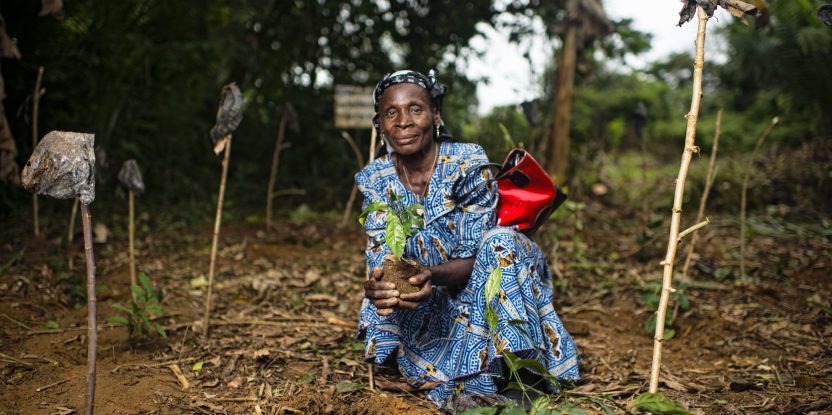
Over the past 12 years, the African Orphan Crops Consortium (AOCC) has trained 172 scientists – 40% of whom are women – from 28 African countries in genomics-assisted crop improvement through its flagship African Plant Breeding Academy (AfPBA), managed by the University of California, Davis.
These scientists have contributed significantly to enhancing local food crops for better yield, climate resiliency, and nutrition: between them, they have launched 143 improved crop varieties and published over 650 scientific papers—and the now 45-member consortium is ready for more.
“The AOCC model is to identify traditional food crops that could make a difference substantially, in nutrition and in economic growth for African countries; to sequence and annotate the genomes of those traditional crops; and then to equip African scientists to be able to use those genomic resources to develop the improved varieties that farmers want and consumers need, faster and better,” said Rita Mumm, AfPBA’s director and AOCC’s director of capacity development and mobilisation.
She made the comments at a Nairobi workshop co-facilitated by the Food and Agriculture Organization of the United Nations (FAO) on Friday 11 October 2024. There, AfPBA alumni and other experts assessed progress to date towards eradicating chronic hunger, malnutrition and stunting in Africa through year-round access to locally available, nutritious food crops for daily dietary diversity.
The workshop was held on the premise that the AOCC’s proof of concept has been demonstrated, that the implementation ‘movement’ has begun and that the development model is ready for further support and investments to expand and amplify AOCC’s impacts to help achieve food and nutritional security.
“An unprecedented acceleration is required,” said AOCC founder Howard-Yana Shapiro, the former Chief Agricultural Officer for Mars, Inc. “We must help our graduates embed the essential elements of the AOCC nutritional security model into agricultural strategies and initiatives of every African country.”
Alice Muchugi, team leader for biodiversity and tree genetic resources at the Center for International Forestry Research and World Agroforestry (CIFOR-ICRAF), agreed on the urgency of scaling up. “The stakes could not be higher, with a rapidly growing population and increasing pressure on the world food system, coupled with the changing climate and its impact on crop production,” she said.
“We need to harness the full capacity of our local crops to provide sustainable solutions for both nutrition and economic empowerment,” continued Muchugi. “We are already aware that 30% of known tree species are at risk of extinction. Before they go extinct, we need to bring them to the farms and utilize their beautiful nutritional profiles in local and regional diets.”
“The appropriate use of CRISPR genomics technology – a central focus of AfPBA training – will play a key role in this quest,” said David Savage, a professor of biochemistry, biophysics and structural biology at the University of California Berkeley and the Innovative Genomics Institute (IGI).
“In a changing climate, there are many, many challenges in terms of biotic and abiotic stressors,” said Savage, “and I believe that these kinds of technologies – genome editing coupled with plant breeding advances and Indigenous knowledge – will be critical in addressing such challenges.”
“Building regional capacity for the application of research in this arena, including the knowledge and infrastructure to support it, is critical,” said Hamadi Boga, the vice president of programme delivery at the Alliance for a Green Revolution in Africa (AGRA). “The science and technology conversations must move outside the lab,” he said. “We have good scientists and we have good systems of producing scientists, but we have weak systems of innovation and implementation.”
Amidst a range of presentations from AfPBA alumni and other experts, two panel discussions were held to address current constraints limiting the impact of the work so far. The panels also explored and brainstormed actions to support, extend and amplify AOCC outcomes, aiming to benefit farmers, women, consumers and emerging businesses in the future.
The event also marked the launch of a new partnership between AOCC and the humanitarian organization, Roots of Peace, dedicated to removing landmines and restoring war-torn regions through replanting and rebuilding efforts. “The only good thing about these mines,” said Roots of Peace founder and 2023 World Food Prize Laureate Heidi Kühn, “is that they leave fertile ground for growth once they are removed. We can plant peace through agriculture, applying the expertise that today’s AOCC graduates bring to secure a brighter future for the continent.”
Chikela Mba, deputy director of the FAO’s plant production and protection division, emphasized the urgency of scaling up the AOCC’s efforts for African food and nutrition security going forward. “The time is now,” he said. “Strife is increasing; political instability and climate change are intensifying – it is the perfect storm. If we don’t act now to reverse this unfortunate narrative of perennial hunger and malnutrition in Africa, we may miss the opportunity.”
Tony Simons, former director general of ICRAF and a World Agriculture Forum Council member, was clear about what immediate actions were required. “Africa has the skills; Africa has the tools,” he said. “What’s needed now is the political will and the financial investments to make it happen.”
We want you to share Forests News content, which is licensed under Creative Commons Attribution-NonCommercial-ShareAlike 4.0 International (CC BY-NC-SA 4.0). This means you are free to redistribute our material for non-commercial purposes. All we ask is that you give Forests News appropriate credit and link to the original Forests News content, indicate if changes were made, and distribute your contributions under the same Creative Commons license. You must notify Forests News if you repost, reprint or reuse our materials by contacting forestsnews@cifor-icraf.org.